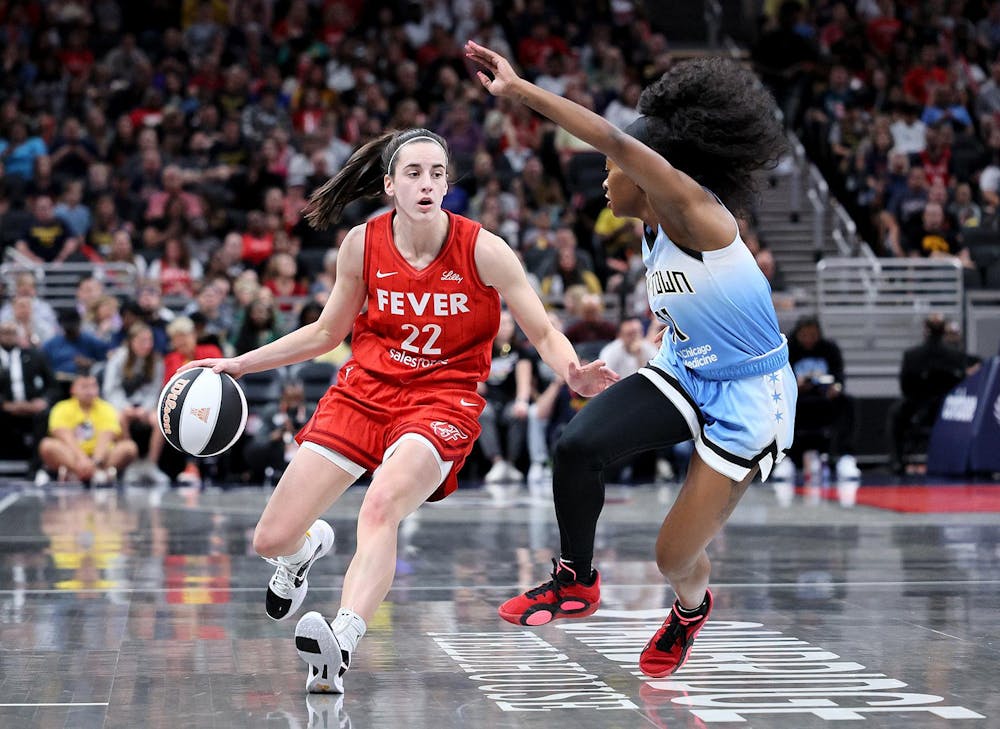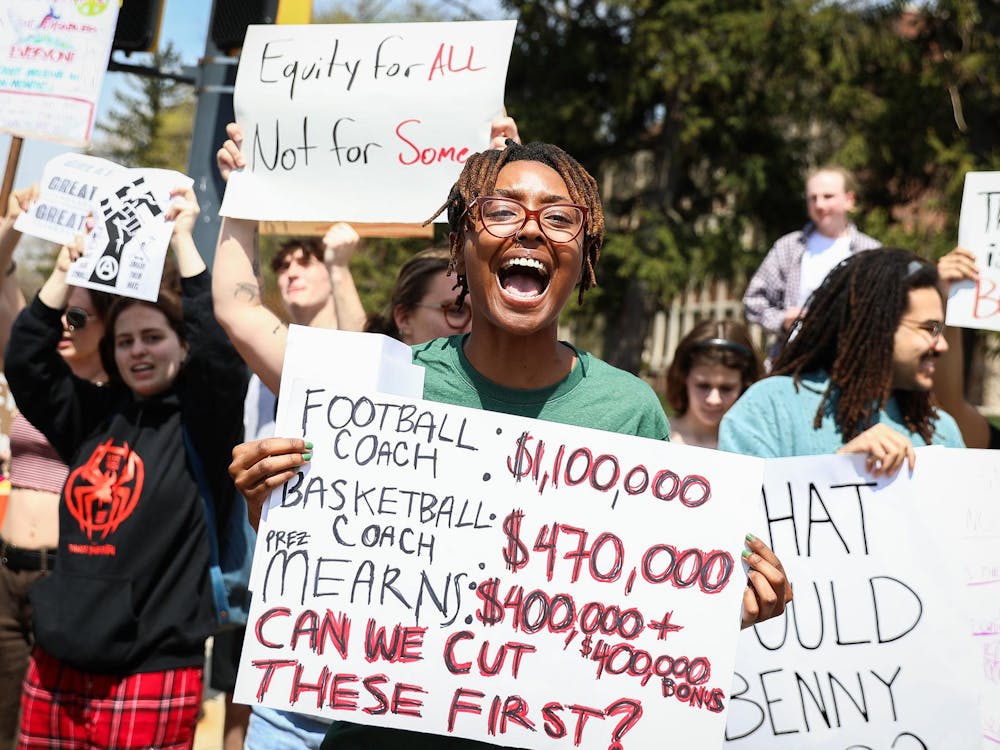Kyle Smedley is a fourth-year journalism major and writes “Meaningful Conversation” for the Daily News. His views do not necessarily reflect those of the newspaper.
Those competing multiple times each week in the WNBA are among the top one percent of athletes in the world. The maximum of 144 players put their bodies on the line each time they step onto the hardwood, with numerous players every season missing extended time due to injury.
What many people don’t consider is that these same athletes also put their mental health on the line as a professional athlete. A recent anonymous email Connecticut Sun guard and 2024 WNBA Most Improved Player Dijonai Carrington shared via her Instagram story left me feeling nauseous.
The email contained death threats, hopes of potential sexual assault toward Carrington and a subject line calling the 26-year-old Black woman the “N-Word.” This post was shared less than two days after Carrington accidentally poked Indiana Fever guard and WNBA Rookie of the Year Caitlin Clark in the eye while she was trying to block the Iowa alumna’s shot in Game 1 of a first-round playoff series.
I tossed and turned in my bed for at least 30 minutes after I viewed Carrington’s Instagram story. I was trying to clear my mind and sleep, but even that simple of a task proved to be difficult. I woke up the next morning still angry.
I’m not trying to play white savior by writing this column; I understand my role as a white, straight cisgender male. And it should be emphasized that the increase in racism surrounding the WNBA isn’t Caitlin Clark’s fault.
She has been nothing but supportive of all WNBA players, regardless of their race, sexual orientation or gender identity. It just so happens that a majority of these hateful comments directed toward players of color come from so-called Indiana Fever or Caitlin Clark fans.
According to a 2024 study from World Population Review, 56 percent of Indianapolis residents are white, whereas 29 percent of Indianapolis citizens are Black. What’s more, Iowa City, the town in which the University Iowa is located, has a 76 percent white population, largely outnumbering the 8.5 percent of the Black population.
Let’s be clear: not all white people are racist. However, you won’t see any Black person calling another person who looks like them the “N-Word” in a hateful email or X comment.
I’ll never know what it feels like to be called a slur, but if simply reading comments like those directed at Carrington draws this much emotion out of me, try to imagine how she felt. Well, Carrington played against Clark and the Fever less than 24 hours after posting the email and scored 10 points in 25 minutes.
Think about it this way: what if the common citizen had to go work their 9-5 job right after being called a slur and receiving a death threat? It happened every day for years before and during the Civil Rights Movement, but that was 60-plus years ago.
According to a 2019 study from the Pew Research Center, 71 percent of Black United States citizens polled believed race relations in the United States are poor. 56 percent of white citizens polled felt the same.
This was before George Floyd was killed by a Minneapolis police officer in 2020, inciting riots and general unease surrounding racism in America. The impact of Floyd’s death is still being felt today, and it has permeated sports fandom in its wake.
However, I believe sports fandom has never been more toxic than it is in 2024. We’ll get back to the WNBA soon, but homophobia is even becoming prominent in the NBA and NFL with players like the Chicago Bears’ Caleb Williams and the Philadelphia 76ers’ Jared McCain showcasing their personalities in the form of TikTok dances and painted nails.
Many fans on social media will poke fun at Williams or McCain not acting as masculine as the majority of NFL and NBA athletes, even if neither man is openly a part of the LGBTQ+ community. Homophobia has always been prevalent in the WNBA, with some of the most recent examples surrounding the Phoenix Mercury’s Britney Griner.
Griner made headlines after being arrested in February 2022 at a Moscow airport for possession of marijuana. When she was released from prison after a 10-month detainment in Russia, more eyes were on Griner and the WNBA than there had been for years prior.
While much of the conversation focused on whether or not Griner’s detainment was fair, a chunk of sports fans on social media used the increased eye balls as a chance to question Griner’s gender identity. The 33-year-old, biracial woman has openly been a member of the LGBTQ+ community since 2013, but it’s widely known that Griner was assigned female at birth.
However, many social media users who are so-called “sports fans,” openly directed anti-trans and anti-LGBTQ+ phrases at Griner. The nine-time WNBA All-Star has spoken on-record about the affects these comments have had on her mental health, and yet, homophobic comments persist across the WNBA social media community.
When it comes to the topic of racism in sports, there has never been an era where it hasn’t existed. But in 2024, these hateful comments are more accessible than ever due to the inescapable presence of social media.
Women’s basketball players, including Clark, are not allowed to simply focus on playing the sport they love for a living and celebrate the triumphs that come as a result of it. Black players, LGBTQ+ players and other players of color are subjected to constant ridicule, and that hate speech is turned up to 11 because the majority of the WNBA’s players identify as women.
I’ve covered the WNBA for other publications, sharing conversations with the widely-controversial Angel Reese, among others. The Chicago Sky center has been (unwillingly) appointed to be Clark’s career rival as soon as the two went head-to-head in the 2023 Women’s College Basketball National Championship.
Reese’s LSU came out on top, and she celebrated by pointing at her ring finger to signify the victory. In almost all other athletic situations, this wouldn’t cause a fan to bat an eye.
NBA players celebrate big plays and big wins all the time, and they are celebrated for it. For whatever reason, the national media took this short moment and ran with it, heralding Clark as the scrappy underdog who was trampled by Reese, the cocky villain.
Reese, a 22-year-old Black woman, has said on-record that the adversarial role she embodies on the court is all an act. Clark has spoken highly of Reese in the year and a half since. My brief personal interactions with Reese this past summer while writing for the IndyStar were nothing but positive.
Reese, like Clark, just loves to play basketball. She just has a different way of showing it, and that should be enough for fans to accept. However, certain fans have proved to me that they are incapable of moving past their harmful habits by sending emails with racial undertones complaining about my objective coverage of Reese and the Sky.
That said, I believe many of those who claim to support Caitlin Clark and the Fever are just using their “fandom” as an excuse to exhibit racist, sexist or homophobic tendencies.
The WNBA released a statement condemning racism toward its players hours after Carrington revealed the previously mentioned hateful email. A social media statement isn’t enough.
Many of those rallying behind Carrington believe Clark should be more outspoken about incidents like this, given the fact that it is mostly Clark’s fans who are displaying these tendencies. However, I believe it should not be the responsibility of Caitlin Clark, Dijonai Carrington, Angel Reese or any other player to put an end to these comments.
It’s the responsibility of WNBA administration, and it’s the responsibility of social media owners like Elon Musk and Mark Zuckerberg to further regulate what is posted on platforms like X and FaceBook. Free speech is essential to sports fandom, but hate speech helps no one.
Not Caitlin Clark. Not the Indiana Fever. Not the WNBA. Not other fans. No one.
Contact Kyle Smedley via email at kmsmedley213@gmail.com or via X @KyleSmedley_.





